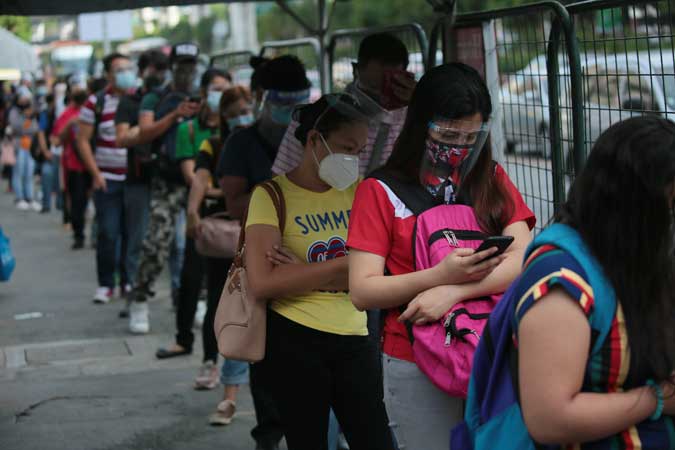Ponzi ghost seduces more Filipinos amid pandemic

Keren Concepcion G. Valmonte
CHRISTIA CARRYLE R. GAMBOA, 17, lost P43,000 ($900) after she was enticed to invest in a money-making scheme that promised to double her money in less than two weeks.
“I was excited,” she said in a Facebook Messenger chat in Filipino. “My initial investment had more than doubled to P500 by the second week.”
Like most people looking for easy money amid hardships caused by the coronavirus pandemic — Ms. Gamboa’s parents were jobless after their mom-and-pop store was shut — she knew she had to bet more.
 Ms. Gamboa, who was recruited by her cousin, managed to convince her parents to invest in Wonka Cash as well. the time the corporate regulator stopped the Ponzi scheme in April, her relatives had lost P230,000.
Ms. Gamboa, who was recruited by her cousin, managed to convince her parents to invest in Wonka Cash as well. the time the corporate regulator stopped the Ponzi scheme in April, her relatives had lost P230,000.
Financial fraud was big business even before the pandemic, costing victims around the world $5.13 trillion a year. It has worsened in new and unforeseen ways.
The Securities and Exchange Commission (SEC) in the Philippines published 127 warnings against investment scams last year, nearly double the number in 2019.
It has put out 40 advisories this year, more than a quarter of which were issued in April alone. That such scams would proliferate amid a pandemic was hardly a surprise to investigators.
“With or without the pandemic, consumer fraud and investment scams will always be here,” said Yellowbelle del Mundo Duaqui, an assistant professorial lecturer of sociology at De La Salle University in Manila.
“It is flourishing now because many, including scammers, are cash-strapped,” she said in an e-mail.
President Rodrigo R. Duterte locked down the entire Luzon island — one of the tightest and longest lockdowns in the world — in mid-March last year to contain the coronavirus, forcing people to stay home and businesses to shut down.
Philippine unemployment rose to a record 10.3% last year, equivalent to 4.5 million jobless Filipinos, according to the Philippine Statistics Authority.
Joblessness rose to 8.7% in April, when the government tightened the lockdown in Metro Manila and nearby provinces to curb a fresh surge in coronavirus infections. The rate was 7.1% in March.
More than 4 million Filipinos were jobless, higher than 3.4 million a month earlier.
‘MODUS OPERANDI’
“The scheme employed by Wonka Cash shows a possible Ponzi scheme where monies from new investors are used in paying fake profits to prior investors,” the SEC said in an April 13 advisory.
The scheme was “designed mainly to favor its top recruiters,” the regulator said, noting that investors in the bottom of the pyramid were likely to lose their money.
The Ponzi scheme is among the three most widely used scams in the country after pyramid scams and boiler room operations, the SEC Enforcement and Investor Protection Department said in an e-mail.
After immigrating to the US in 1903, Carlo Ponzi devised a low-tech but high-payoff fraud. It involved buying discounted US postal reply coupons overseas and then selling these at face value at Boston post offices.
But he was really using the money from new investors to pay interest to previous investors. Mr. Ponzi promised to give investors $150 for every $100 they loaned him within 45 days. His caper didn’t end well.
Mr. Ponzi took half a dozen Boston banks down with him, and served prison terms in Massachusetts, Florida, and Georgia. He was deported back to his native Italy in 1937. Twelve years later, he died blind, partially paralyzed and penniless at a charity hospital in Brazil at 66 years old.
“When it becomes difficult to recruit new investors or when a large number of investors ask to cash out, the Ponzi scheme collapses as the inflow of funds is not enough to support the promised return,” the SEC said.
Under the pyramid scheme, which shields its operations by sometimes using legitimate products, investors earn from recruitment fees. Some multi-level marketing plans have been classified as pyramid scams.
Meanwhile, a boiler room operation — usually a call center — uses high-pressure salespeople to call so-called sucker lists or potential investors to peddle speculative, sometimes fraudulent stocks.
Aside from the three, scammers also use foreign exchange trading and cryptocurrency mining as a front for their illegal activities.
“Fraudsters have taken advantage of the fast-evolving investment landscape by masking their modus operandi with relatively new and complex concepts such as cryptocurrencies and other digital assets,” the commission said.
MORAL BREAKDOWN
Josef Diy Singson, a portfolio manager at Buhawi Investment Management, said the rise in scams related to cryptocurrencies is driven by ignorance.
“It’s new, not many people know about it and unfortunately, we don’t have a good degree of financial literacy,” he said in a Zoom Cloud Meetings app interview.
Sometimes, investment scams are disguised as donation drives.
“The pandemic has given scammers the right logistic opportunity and the emotional appeals to pity, karma, religion and poverty,” Ms. Duaqui said.
People with disposable income are looking for ways to diversify during the health crisis due to the physical limits of traditional investment options, she said.
“On the other hand, you have investment predators lurking around.”
Ms. Duaqui noted that crises such as wars, economic depression and pandemics usually lead to a moral breakdown — “values are blurred, goodness is exploited and criminal or deviant acts are escalated.”
People should remain vigilant, she said, adding that the government should boost consumer protection against fraud and investment scams.
Buhawi Investment’s Mr. Singson said research materials from the right sources are key, whether you’re thinking about putting your money in cryptocurrencies or the stock market.
“Do your own research, do your due diligence. Assess where you’re getting the information.”
Ms. Duaqui said the state and civil society should promote financial literacy, apart from ensuring legal accountability.
“Criminal liability should be the main jurisdiction of the government to make sure that cases of fraud and the criminals are punished.”
Ms. Gamboa, the teenager from Nueva Ecija, is now part of a Facebook group called Wonka Cash Scammed which has 1,400 members.
Some victims of the Ponzi scheme have reached out to the corporate regulator and National Bureau of Investigation, while others have reported the fraud to their local governments.
“You have to seriously think about where your money is going,” she said. “Even if you’re not losing a lot, what you lose could be enough to get you through another day. Times are hard.”
